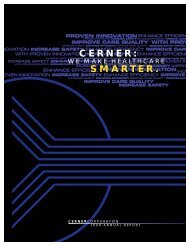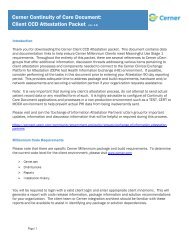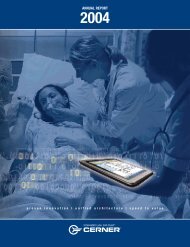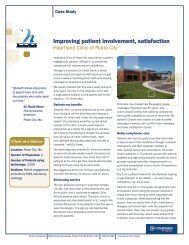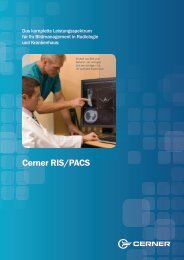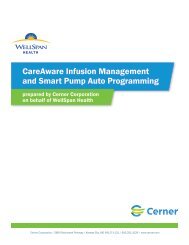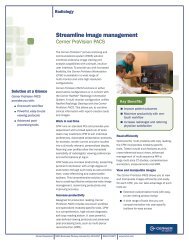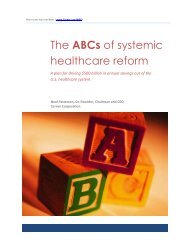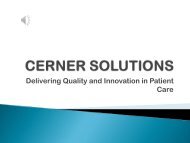The ABCs of systemic healthcare reform - Cerner Corporation
The ABCs of systemic healthcare reform - Cerner Corporation
The ABCs of systemic healthcare reform - Cerner Corporation
- No tags were found...
You also want an ePaper? Increase the reach of your titles
YUMPU automatically turns print PDFs into web optimized ePapers that Google loves.
<strong>The</strong> effects <strong>of</strong> inflation on the Company's business during 2008, 2007 and 2006 were not significant.<br />
Recent Accounting Pronouncements<br />
In September 2006, the Financial Accounting Standards Board (FASB) issued Statement <strong>of</strong> Financial Accounting Standards No.<br />
157 (SFAS 157), "Fair Value Measurements." This statement establishes a single authoritative definition <strong>of</strong> fair value when<br />
accounting rules require the use <strong>of</strong> fair value, sets out a framework for measuring fair value and requires additional disclosures<br />
about fair value measurements. On February 12, 2008, the FASB issued FASB Staff Position (FSP) No. FAS 157-2. This FSP<br />
defers the effective date <strong>of</strong> SFAS 157 to fiscal years beginning after November 15, 2008 for nonfinancial assets and liabilities<br />
within the scope <strong>of</strong> the FSP. <strong>The</strong> Company adopted SFAS 157 for fair value measurement outside <strong>of</strong> the scope <strong>of</strong> FSP No. 157-<br />
2 on December 30, 2007. On October 10, 2008, the FASB issued FSP No. FAS 157-3 that clarifies the application <strong>of</strong> SFAS 157<br />
in a market that is not active. FSP No. 157-3 is effective for all periods presented in accordance with SFAS 157 and the<br />
Company has considered the guidance with respect to the valuation <strong>of</strong> its financial assets and their designation within the fair<br />
value hierarchy. <strong>The</strong> Company was required to fully adopt SFAS 157 as <strong>of</strong> the first day <strong>of</strong> the 2009 fiscal year and does not<br />
expect its adoption to have a material impact on the Company’s consolidated financial statements.<br />
In December 2007, the FASB issued Statement <strong>of</strong> Financial Accounting Standards No. 141 (revised 2007), “Business<br />
Combinations” (SFAS 141(R)) which replaces SFAS 141 and supersedes FIN 4, “Applicability <strong>of</strong> FASB Statement No. 2 to<br />
Business Combinations Accounted for by the Purchase Method.” SFAS 141(R) establishes guidelines for how an acquirer<br />
measures and recognizes the identifiable assets, goodwill, noncontrolling interest, and liabilities assumed in a business<br />
combination. Additionally, SFAS 141(R) outlines the disclosures necessary to allow financial statement users to assess the<br />
impact <strong>of</strong> the acquisition. <strong>The</strong> Company is currently assessing the impact <strong>of</strong> adoption <strong>of</strong> SFAS 141(R), which will depend on<br />
future acquisition activity, and will be required to adopt SFAS 141(R) prospectively for business combinations occurring on or<br />
after the first day <strong>of</strong> the 2009 fiscal year.<br />
Also in December 2007, the FASB issued Statement <strong>of</strong> Financial Accounting Standards No. 160 (SFAS 160), “Noncontrolling<br />
Interests in Consolidated Financial Statements,” which amends ARB No. 51. SFAS 160 guides that a noncontrolling interest in<br />
a subsidiary should be reported as equity in the consolidated financial statements, and that net income should be reported at<br />
amounts that include the amounts attributable to both the parent and the noncontrolling interest. <strong>The</strong> Company is currently<br />
assessing the impact <strong>of</strong> adoption <strong>of</strong> SFAS 160 on its results <strong>of</strong> operations, which is expected to be immaterial, and its financial<br />
position and was required to adopt SFAS 160 as <strong>of</strong> the first day <strong>of</strong> the 2009 fiscal year.<br />
In March 2008, the FASB issued Statement <strong>of</strong> Accounting Standards No. 161 (SFAS 161), “Disclosures about Derivative<br />
Instruments and Hedging Activities – an amendment <strong>of</strong> FASB Statement No. 133.” SFAS 161 requires enhanced disclosures<br />
about the uses <strong>of</strong> derivative instruments and hedging activities, how these activities are accounted for, and their respective<br />
impact on an entity’s financial position, financial performance, and cash flows. <strong>The</strong> Company is currently assessing the impact<br />
<strong>of</strong> adoption <strong>of</strong> SFAS 161 on its results <strong>of</strong> operations and its financial position, which is expected to be immaterial, and was<br />
required to adopt SFAS 161 as <strong>of</strong> the first day <strong>of</strong> the 2009 fiscal year.<br />
Critical Accounting Policies<br />
<strong>The</strong> Company believes that there are several accounting policies that are critical to understanding the Company’s historical and<br />
future performance, as these policies affect the reported amount <strong>of</strong> revenue and other significant areas involving<br />
management’s judgments and estimates. <strong>The</strong>se significant accounting policies relate to revenue recognition, s<strong>of</strong>tware<br />
development, potential impairments <strong>of</strong> goodwill and income taxes. <strong>The</strong>se policies and the Company’s procedures related to<br />
these policies are described in detail below and under specific areas within this “Management Discussion and Analysis <strong>of</strong><br />
Financial Condition and Results <strong>of</strong> Operations.” In addition, Note 1 to the consolidated financial statements expands upon<br />
discussion <strong>of</strong> the Company’s accounting policies.<br />
47



